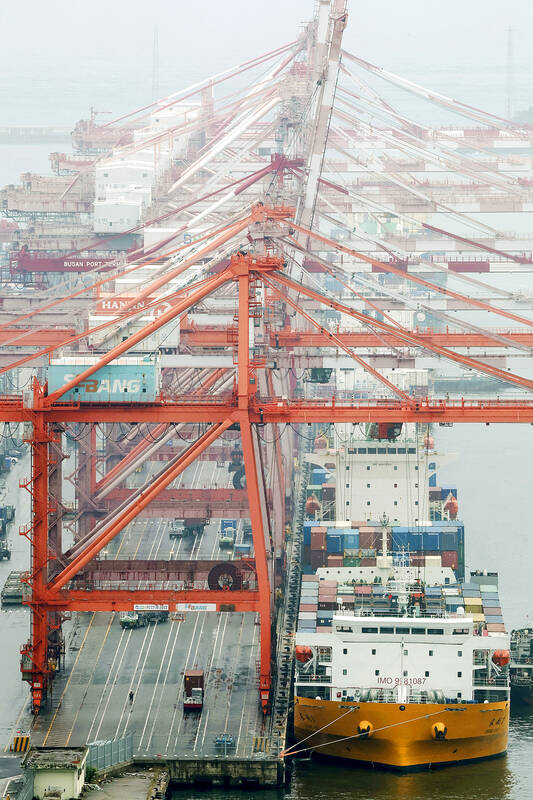South Korean exports offered an early sign of improvement in global trade after their first year-on-year gain since last summer.
Preliminary trade data showed a 5.3 percent gain in exports in the first 20 days of this month from a year earlier for the first increase since August last year, a possible sign that a slowdown in world demand is starting to ease.
The rise was largely driven by gains in auto and shipping-related exports, while semiconductor exports continued to drop.

Photo: EPA-EFE
As a key provider of chips and smartphones for the global economy, South Korea’s export data offer one of the earliest pulse checks on the strength of international trade and tech-sector demand.
While the figures were encouraging, it is too early to gauge how fast any recovery might be, Australia and New Zealand Banking Group economist Krystal Tan (譚恩) said.
“But it does look like we’re nearing a bottom,” Tan said.
An improvement in the nation’s shipments can be a leading indicator for the wider trend, although economists warn against drawing concrete conclusions from an incomplete set of monthly figures.
“The data indicates global trade may have bottomed out, but whether it is set for a full-on recovery will be something to be watched,” said Moon Jung-hiu, economist at KB Kookmin Bank in Seoul.
Gains were led largely by shipments to the US, steady demand for automobiles and a jump in shipping-related demand.
Exports to the EU and Hong Kong also advanced on a year-on-year basis, although shipments to China were down again.
The results fit in with a picture of a US economy showing resilience, despite a string of rate hikes, while China’s recovery continues to disappoint even as policymakers there ramp up stimulus to try and restore momentum.
A full recovery in global trade depends largely on China — a major engine of the world economy — and a resurgence in appetite for chips, which go into everything from vehicles to electronic devices.
The figures have to be taken “with a grain of salt and can be seen as US exports stabilizing rather than a surge,” Tan said.
Even with the gain, overall exports were still about 18 percent lower from their 20-day peak in March last year.
A measure of average daily exports, which removes potential distortions from changes in the number of working days, also showed that shipments were not as strong as the headline figure indicated.
The average inched down 2 percent, although that was the smallest fall since exports began to drop last year.
The 20-day data showed that auto exports more than doubled. Shipping-related demand, a factor that sometimes skews monthly figures, was also up by more than 100 percent.
While semiconductor exports fell 23.5 percent, the drop eased compared with last month’s full month figures.
Overall imports declined 11.2 percent, resulting in a trade deficit of US$1.61 billion.

NEW IDENTITY: Known for its software, India has expanded into hardware, with its semiconductor industry growing from US$38bn in 2023 to US$45bn to US$50bn India on Saturday inaugurated its first semiconductor assembly and test facility, a milestone in the government’s push to reduce dependence on foreign chipmakers and stake a claim in a sector dominated by China. Indian Prime Minister Narendra Modi opened US firm Micron Technology Inc’s semiconductor assembly, test and packaging unit in his home state of Gujarat, hailing the “dawn of a new era” for India’s technology ambitions. “When young Indians look back in the future, they will see this decade as the turning point in our tech future,” Modi told the event, which was broadcast on his YouTube channel. The plant would convert

‘SEISMIC SHIFT’: The researcher forecast there would be about 1.1 billion mobile shipments this year, down from 1.26 billion the prior year and erasing years of gains The global smartphone market is expected to contract 12.9 percent this year due to the unprecedented memorychip shortage, marking “a crisis like no other,” researcher International Data Corp (IDC) said. The new forecast, a dramatic revision down from earlier estimates, gives the latest accounting of the ongoing memory crunch that is affecting every corner of the electronics industry. The demand for advanced memory to power artificial intelligence (AI) tasks has drained global supply until well into next year and jeopardizes the business model of many smartphone makers. IDC forecast about 1.1 billion mobile shipments this year, down from 1.26 billion the prior

People stand in a Pokemon store in Tokyo on Thursday. One of the world highest-grossing franchises is celebrated its 30th anniversary yesterday.

Zimbabwe’s ban on raw lithium exports is forcing Chinese miners to rethink their strategy, speeding up plans to process the metal locally instead of shipping it to China’s vast rechargeable battery industry. The country is Africa’s largest lithium producer and has one of the world’s largest reserves, according to the US Geological Survey (USGS). Zimbabwe already banned the export of lithium ore in 2022 and last year announced it would halt exports of lithium concentrates from January next year. However, on Wednesday it imposed the ban with immediate effect, leaving unclear what the lithium mining sector would do in the